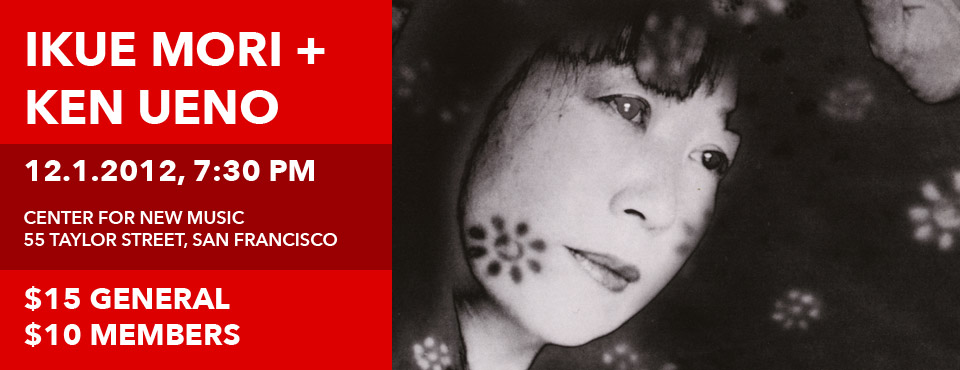One of the pioneers of laptop electronics, Ikue Mori continues to be one of the most respected and original voices in the laptop electronic music scene. Mori’s music comes from machines but evokes the natural world, pulling in sounds like dripping water, crackling electricity, and warped chimes to create compelling, atmospheric soundscapes of the organic world. Vocalist Ken Ueno will join her, contributing an extended technique vocal style rooted in Tuvan throat singing and metal-style sub-tone growls.
[bra_button text=”BUY TICKETS” url=”https://c4newmusic.tixato.com/buy/ikue-mori-ken-ueno/12-01-2012-0730pm” target=”_blank” size=”large” style=”rounded” color=”blue”]
Drummer and composer IKUE MORI moved from Tokyo to New York in 1977 and shortly thereafter formed the seminal No Wave band DNA with Arto Lindsay and Tim Wright. When the group disbanded in 1982, she began performing improvisations and collaborating with artists such as Fred Frith, Kato Kideki, Marc Ribot, Tom Cora, and John Zorn. In 1990, she received an NEA grant to work with filmmaker Abigail Child, marking the beginning of several soundtrack projects for Mori. After winning the Prix Ars Electronics award in Digital Music in 1999, Mori began using laptop computers to create not only sounds but visual materials as well. This fascination with mixed media has more recently led Mori to incorporate animated cutouts from Japanese woodblock prints into her presentations. Mori has received grants from the Foundation for Contemporary Arts and the NY Electronic Art Festival/NYSCA. In 2007, she was commissioned to create a live sound track for the silent films of Maya Deren, and she has also received commissions from Montalvo Arts Center and WSR German radio program. In 2009, Mori served as curator for Unlimited 23, a three‐ day music festival in Wels, Austria. Her current groups include The Kibyoshi Project with Mark Nauseef and Koichi Makigami, MEPHISTA with Sylvie Courvoisier and Susie Ibarra, projects with Kim Gordon, PHANTOM ORCHARD with Zeena Parkins, and multiple projects with John Zorn.
Winner of the 2006‐2007 Rome Prize and the 2010‐2011 Berlin Prize, KEN UENO is a composer, vocalist, improviser, and cross‐disciplinary artist. His music coalesces diverse influences into a democratic sonic landscape. In addition to Heavy Metal sub‐tone singing and Tuvan throat singing, he is also informed by European avant‐garde instrumental techniques, American experimentalism, and sawari or beautiful noise, an aesthetic in traditional Japanese music. Ueno’s artistic mission is to champion sounds that have been overlooked or denied so that audiences reevaluate their musical potential. In an effort to feature inherent qualities of sound such as beats, overtones, and artifacts of production noise, his music is often amplified. Ueno’s music has been performed at Lincoln Center, the Kennedy Center, the Metropolitan Museum of Art, MusikTriennale Köln Festival, the Muziekgebouw, the Hopkins Center, Spoleto USA, and Steim. Ensembles and performers who have played his music include Kim Kashkashian and Robyn Schulkowsky, Frances‐Marie Uitti, Alarm Will Sound, and the Bang on a Can All‐Stars. As a vocalist, Ueno specializes in extended techniques (overtones, throat‐singing, multiphonics, extreme registers, circular singing), and has collaborated in improvisations with Joey Baron, Joan Jeanrenaud, Pascal Contet, and many others. His ongoing performance projects include collaborations with Tim Feeney, Matt Ingalls, Du Yun, and Lou Bunk. In recent years, Ueno has collaborated with visual artists, architects, and video artists to create unique cross‐disciplinary art works. With artist Angela Bulloch, he has created several audio installations (driven with custom software), which provide audio input that affect the way her mechanical drawing machine sculptures draw. Working with the landscape architect Jose Parral, Ueno has collaborated on videos, interactive video installations, and a multi‐room intervention at the art space Rialto, in Rome, Italy. Ken is currently an Associate Professor at the University of California, Berkeley.
